Pediatric eye doctor – Learn more with Healthier Baby Today! Several factors must be considered when choosing a pediatric eye doctor for your children.
Your child’s eye health is crucial, so you want to ensure that you make the best choice for their needs.
As children grow, their eyes change rapidly. Paying meticulous attention to a child’s eye health can specify initial problems early while their eyes develop.
Table of Contents
1. Visit a Pediatric Optometrist
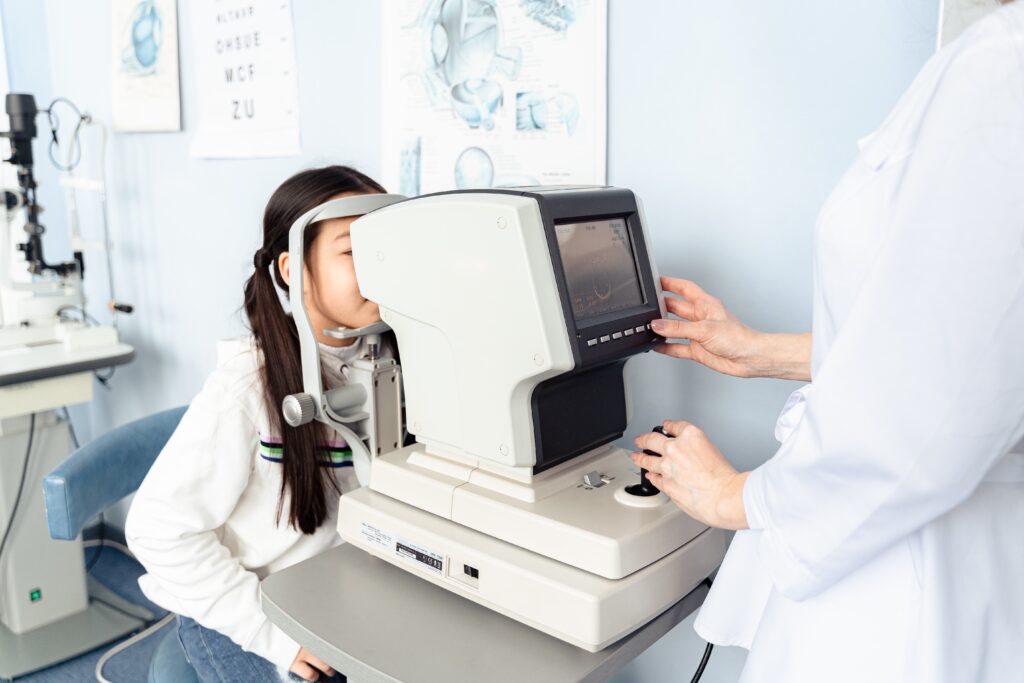
Start by making an appointment for a detailed eye exam for your children with an optometrist.
If they or your pediatrician think your child should be assessed by a pediatric optometrist for more intensive care, they will refer you to a recommended doctor.
Subject to your insurance, you may need a general optometrist, pediatrician, or family physician referral before your insurance provider will cover your appointment.
Eye exams for children are essential to ensure your child’s eyes are healthy and have no vision issues that could interfere with school performance and potentially affect your child’s safety.
Early eye exams also are important because children need visual skills that are essential for optimal learning.
Excellent visual acuity at all distances. Visual acuity characterizes how well your child can see from different lengths.
Visual acuity is assessed with the same eye chart used in an adult’s eye exam for older children who can read.
2. Learning With Shapes for Smaller Children
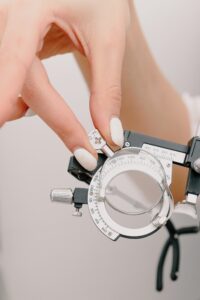
Babies and small children who can’t read are asked to identify different shapes and objects. Peripheral vision. Accurate and comfortable eye-teaming skills and proper eye movement skills.
An eye doctor may request an older child to watch their finger or flashlight as the doctor moves it left and right and up and down.
The doctor will closely monitor the child’s eyes to see how easily they can follow an object moving.
They also evaluate how well the eyes work together to focus on an object. Eye doctors also consider Peripheral vision during this time, measured using the confrontation visual field test with older children.
1. During The Eye Examination
During this examination, the eye doctor will start to span their arm around the side of the child’s head, and the child must inform the doctor when they see the doctor’s hand in their peripheral vision.
The pupils’ responses to light are the same regardless of any age, making the test to calculate pupil function the same for babies and older children
Pediatric optometrists will shine a torch into your child’s eyes. They do this to ensure each pupil responds to the new light by constricting.
The incapacity of one or both pupils to respond to light could illustrate a neurological complication and will likely result in your eye doctor referring your child to a specialist.
The doctor will then run a spectrum of tests to evaluate your child’s visual acuity, pupil function, and eye movement.
2. Depth Perception Testing
During the exam, the doctor also assesses a child’s depth perception — their capacity to see objects three-dimensionally and judge how far or near an object is.
Children also get cataracts; they can be born with or grow them after being born. Without precise medication, pediatric cataracts can cause abnormal links between the brain and the eye that may become irreparable.
The excellent information is that cataracts are often found during the eye screening at birth or at subsequent pediatric vision screenings.
3. Credentials and Training
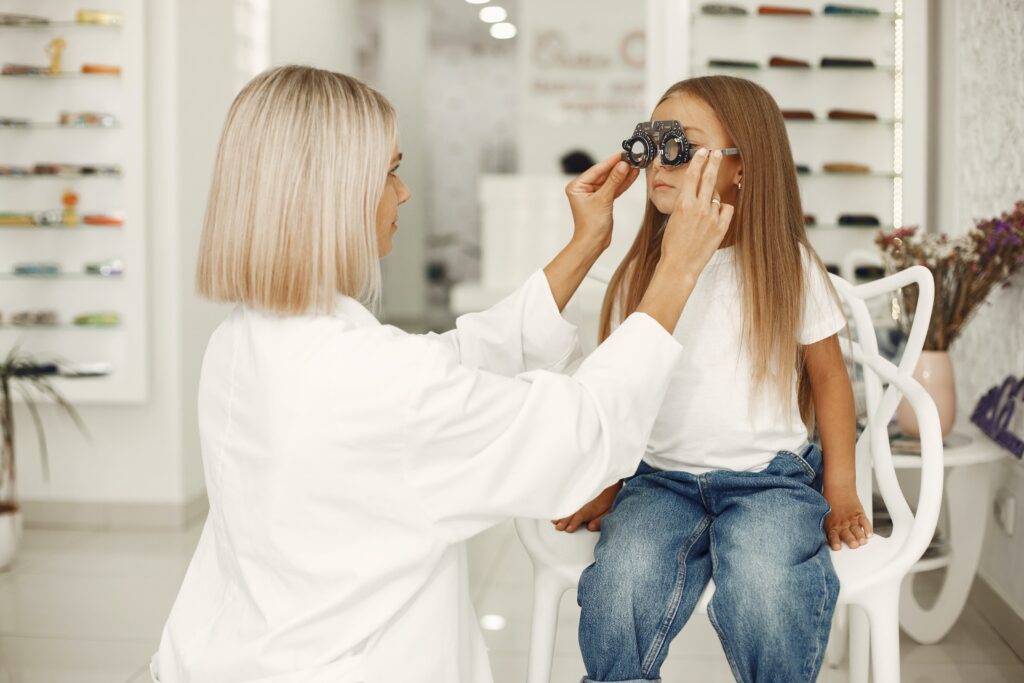
A Pediatric Optometrist is a Doctor of Optometry, abbreviated OD, specializing in children’s eye health.
They have specialized education, training, and experience working with children, performing kid-friendly eye exams, and recognizing and treating child-specific eye illnesses.
A child may be referred to a pediatric optometrist when a general optometrist or pediatrician feels specialized optometric observation is needed.
Often because there may be an eye teaming issue or other complications that cannot be corrected with eyeglasses or contact lenses alone.
Ensure the pediatric eye doctor is a licensed and board-certified optometrist or ophthalmologist. They should have specialized training in pediatric eye care.
4. Experience
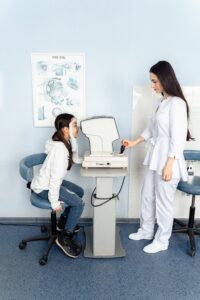
Look for a pediatric eye doctor with experience in treating children. Pediatric eye care can differ significantly from adult care, so experience in this area is essential.
Your child’s optometrist will likely want to dilate your child’s eyes before the examination so they can look inside their eyes and ensure they are healthy.
The doctor will then run a course of tests to examine your child’s visual acuity, eye movement, and pupil function
5. Office Atmosphere
A child-friendly and welcoming office environment can significantly affect how comfortable your child feels during their visit.
Look for an office that caters to children with colorful decor and age-appropriate distractions. The pediatric eye doctor should be able to communicate effectively with both you and your child.
They should explain procedures and diagnoses in a way that is easy to understand, especially for younger patients.
Children can be nervous during eye exams or treatment. A pediatric eye doctor should be patient and understanding, allowing your child to feel at ease during the visit.
They should also have experience assessing and addressing common childhood eye issues, such as lazy eye (amblyopia) and crossed eyes (strabismus).
6. References and Reviews
To become a pediatric optometrist, one must complete a four-year degree from a university or college, four years of work, and clinical study to become a Doctor of Optometry OD.
Another year of residency in pediatric optometry is also required. While optometrists are optometry doctors, they are not medical doctors and do not perform operations.
This is one of the biggest differences between an optometrist and an ophthalmologist. Check online reviews and search for references from other parents who have visited the same pediatric eye doctor.
This can provide valuable insights into the doctor’s reputation and the quality of care they give.
Ensure that the pediatric eye doctor offers a comprehensive range of services, including:
- Eye exams
- Vision or contact lenses
- Correction glasses
- Treatment for eye conditions
Having access to a variety of services under one roof can be convenient for parents
7. Conditions Treated
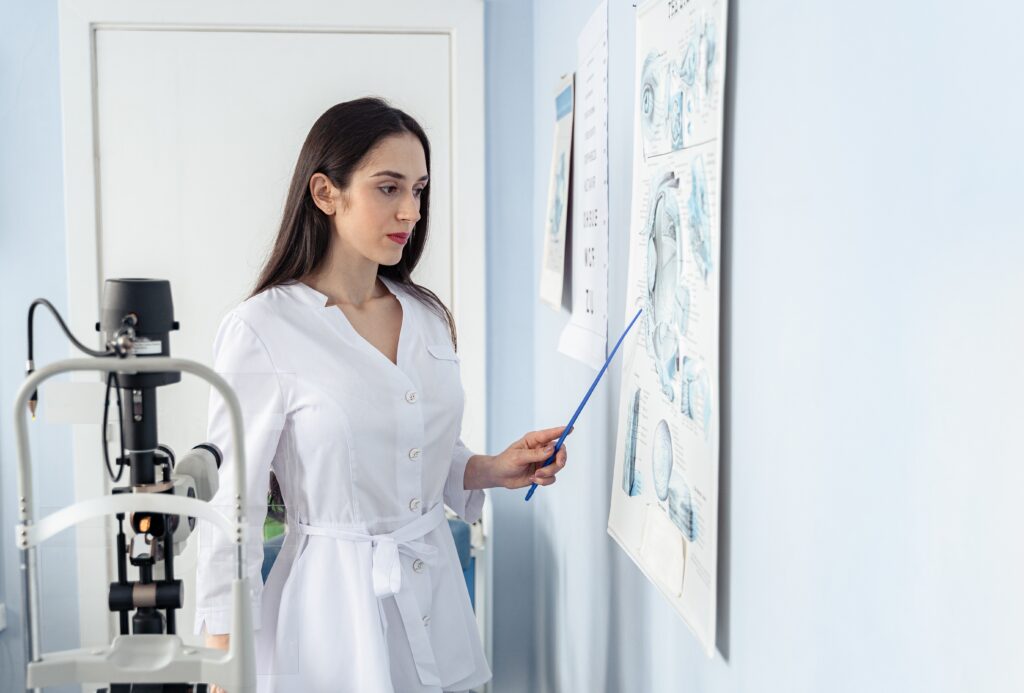
Pediatric optometrists are typically the first stop for kids with vision development problems.
The symptoms most commonly treated in pediatric optometry are:
- Refractive errors: Nearsightedness and farsightedness
- Amblyopia (lazy eye)
- Strabismus (misaligned or crossed eyes)
- Eye health issues include infection, discharge, inflammation, and injury.
8. Color Blindness
The symptoms can be hard to detect. Parents may only notice an issue when a child is learning colors.
One symptom is the inability to distinguish between shades of the same or similar colors. This happens most with green and yellow and red or blue.
If you notice one or more of these symptoms in your kid, schedule an eye exam with an ophthalmologist. Pediatric optometrists can also find more serious conditions that cannot be treated in their rooms.
If your child’s eye doctor is convinced they require a specialist, such as a retina specialist or a neuro-ophthalmologist, they will pass you to one for your child’s unique case.
Important Factors to Know About a Pediatric Eye Doctor…
Remember that your child’s eye health is essential to their overall well-being. Researching and selecting a qualified and experienced pediatric eye doctor can help ensure your child receives the best care for their vision needs.
Good vision is crucial to a child’s physical development, success in school, and overall well-being.
Take children for regular eye tests. These are important for detecting and correcting eye problems early.


